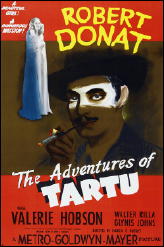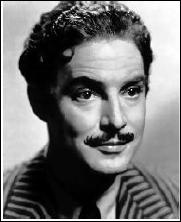Mon 27 Apr 2009
Movie Review: SABOTAGE AGENT (1943).
Posted by Steve under Reviews , Suspense & espionage films[4] Comments
SABOTAGE AGENT. MGM-UK, 1943. Aka The Adventures of Tartu. Robert Donat, Valerie Hobson, Walter Rilla, Glynis Johns, Phyllis Morris, Martin Miller. Director: Harold S. Bucquet.

The title of this movie is so generic that when I taped this from the TCM channel last week, I didn’t know that this is the one I was taping. I had, in fact, never heard of Sabotage Agent before, that Robert Donat was in it didn’t register with me, and except for the title, I had no idea what it was about. Which stretches the truth a little, if not a lot, because what the movie’s about, the title says it all.
But with all that as a lead-in, I have to tell you that watching the movie last night was both a pleasure as well as a surprise — even while fully realizing its built-in limitations and how high a rating I could honestly give it. I’ll get back to this in a minute; let me tell you about some of the pluses first.
It’s a propaganda film for the British home front, that seems obvious, but how stirring it must have been to see one man, a British officer (Robert Donat as Captain Terence Stevenson), disguise himself as a Romanian long enough to infiltrate the Nazi occupation force in Czechoslovakia long enough to blow up a chemical plant that was in the process of building a deadly arsenal of poison gas about to be delivered to England in the next wave of bombs to be dropped?
If you were to say “whew” to that last sentence, then deservedly so, as neither does the story in Sabotage Agent allow the viewer to sit back and recognize all of the flaws of the plot, and how unlikely it all is, as it roars on by.

Donat, who won an Oscar as “Mr. Chips,” wasn’t about to win another one for this film, but he manages to stay balanced on a keen edge between being charming and sincere and ostentatiously flamboyant, only to turn visibly discouraged and disheartened at seeing the excesses (and sheer brutality) of the Nazi rule.
If his career hadn’t been suppressed by his own frailties (asthma), I think he could have been his generation’s equivalent of Charlie Chaplin.
Valerie Hobson plays a Czech woman who finds life with the Nazis is far more palatable by fraternizing openly with them, a game that Donat soon sees through, but making contact with the entire Czech underground proves more of a challenge. A young Glynis Johns probably hardened many a British heart against the Nazis, as her character shows what patriotism is all about.
Unfortunately for the film, Captain Stevenson’s job is made all the easier by the sheer stupidity of the Nazi occupiers, both in the particular and in general, as overall strategists. That plus the fact that none of them seem to be able to shoot straight, in a ending straight out of the B-western or Saturday serial genre, keeps this film from being better known than it is, a curiosity out of the dark days of World War II.
April 28th, 2009 at 12:26 am
Sabotage Agent, also known as Tartu, and The Adventures of Tartu, is exactly what you say, an entertaining wartime flag waver that largely exists for the charms of its star and supporting cast. Towards the end it plays almost like a serial, but an extremely well acted one. A similar spirit could be seen in some of Errol Flynn’s lighter wartime adventures such as Northern Pursuit (written by pulp veteran Frank Gruber) and Desperate Journey (both directed by Flynn’s pal Raoul Walsh) with Flynn, Ronald Reagan, Arthur Kennedy, and Alan Hale playing at modern Musketeers after their RAF bomber crashes behind enemy lines with evil Nazi Raymond Massey after them.
For Donat at his best there is of course Hitchcock’s The 39 Steps, The Count of Monte Cristo, and The Citadel based on A. J. Cronin’s novel of an idealistic doctor, and of course Goodbye Mr. Chips for which he beat out Clark Gable as Rhett Butler for best actor.
A few less well known Donat films worth seeing are The Ghost Goes West, a fantasy in which a rakish Scottish ghost finds his afterlife upset when a rich American buys his castle and moves it to the United States. In Vacation From Marriage he and Deborah Kerr are a dull married couple separated by the war who find when they are reunited they have turned into much more attractive but very different people, it’s a smart well observed comedy romance. In The Magic Box he was fine as William Friese Green, the Englishman who may have invented the movie camera but who had tragically bad timing and luck in proving his patent.
One of Donat’s best films, a splendid adventure, is Knight Without Armor based on James Hilton’s novel Without Honor, about a British secret agent, a rather dull and ordinary fellow, sent to Czarist Russia, who is swept up in the Revolution and ends up rescuing and romancing a beautiful aristocrat, Marlene Dietrich. A young Herbert Lom also appears as Herbert Lomas in the big budget 1937 production. I suspect the basic idea of Sabotage Agent was lifted from this earlier Donat film, though they have little else in common. If you get a chance to see Knight do so by all means. It’s a sumptious production full of action, adventure, and romance, with the quiet frail Donat a surprizingly strong match for sultry Dietrich (who held her own with much more dynamic leading men like Cary Grant, Gary Cooper, and John Wayne). It’s one of her best films and one of his, directed by French refugee director Jacques Feyder.
Donat died fairly young, his last film appearance playing a Chinese mandarin who reluctantly comes to aid missionary Ingrid Bergman in rescuing Chinese war orphans in Inn of the Sixth Happiness. He is probably as famous for turning down the role of Peter Blood in Captain Blood because of his poor health as for most of his films, the part was then offered to Douglas Fairbanks Jr. who also turned it down but suggested a young Tasmainian born Irishman with only a little acting experience, named Errol Flnn.
April 28th, 2009 at 12:23 pm
While David presents a very fine and enthusiastic overview of Robert Donat (the ‘actor’s actor’ of his day) – the ghost laird of The Ghost Goes West and as the luckless Friese-Greene in The Magic Box among my favourites – he is unfortunately mistaken about Herbert Lom as Herbert Lomas (re. Knight Without Armour).
Lomas (1886-1961), a versatile stage actor, was known for his severe Sir Ensor Doone in the 1934 Lorna Doone, the clergyman in The Holly and the Ivy (1950), as well as roles in Rembrandt (1936), Jamaica Inn (1939), The Ghost Train (1941) among others.
Herbert Lom (b. 1917), the psychiatrist Dr. Corder of TV’s The Human Jungle (1963-65) and the frustrated Inspector Dreyfus in the Pink Panther films, was one of the great sinisterly suave villains in British cinema (Night and the City, 1950; North West Frontier/Flame Over India, 1959; and the Ealing comedy The Ladykillers, 1955). However, his earliest film role was in the Associated-British produced semi-documentary Mein Kampf-My Crimes (1940), a propaganda hit for the British war effort.
Still, thank you David for a very interesting view, and welcome reminder, of the works of Robert Donat. Oddly enough, you’ve inspired me to give my DVD of The 39 Steps a re-viewing this evening (for that, many thanks).
April 28th, 2009 at 8:33 pm
You are absolutely right. I reviewed Knight and of course its the wrong Lom/Lomas. When you rewatch the Hitchcock 39 Steps note how many times Hitch remade it over the rest of his career, notably as North By Northwest which is particularly close.
There’s even a scene in the novel (not in the film) where Richard Hannay is briefly pursued from an airplane, a scene you have to wonder about. Could it have inspired the famous cropdusting scene?
Of course almost all modern spy movies and novels owe Steps something, but the basic setup of an innocent man who stumbles into intrigue and is pursued by both police and the villains could almost be a prototype for Hitchcock’s career.
November 22nd, 2020 at 2:40 am
Just watched Sabotage Agent and enjoyed it for all the reasons you mentioned. Perhaps, due to war conditions they certainly glossed over certain aspects of Donat’s character. Suddenly, not only does he speak all the necessary languages, but is also a master of disguise and fantastic actor to boot.
The film could have benefited from some spy training school or something like that before he is sent on his deadly mission. Maybe they could have even given him a suicide pill or something like that to increase suspense on being caught alive. Just some thoughts on some ideas that would have elevated the story.
For instance, the Nazi characters could have been treated better. Compare these Nazis to those in Casablanca made a couple of years earlier. Conrad Veidt gives a believable portrayal of his Nazi officer. Casablanca also lends a good contrast of the type of film that served propaganda purposes, but all transpired it’s limitations. Of course, it’s a classic and Sabotage Agent is relatively obscure now. It’s the difference between the approach to character as realistic or symbols. Somehow, Casablanca gave life to its characters.
Donat’s charm is ultimately the saving grace of this film as he is so much fun to watch.